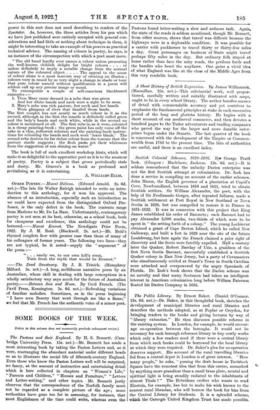The Public Library. By Ernest Baker. (Daniel O'Connor. 12s. 6d.
net.)—Dr. Baker, in this thoughtful book, sketches the development of municipal libraries and rural libraries and describes the methods adopted, as at Poplar or Croydon, for bringing readers to the books and giving lectures by way of "library extension." He then discusses possible reforms in the existing system. In London, for example, he would encour- age co-operation between the boroughs. It would not be necessary for each borough reference library to buy costly works which only a few readers need if there were a central library from which such books could be borrowed for the local library at which they were required. Dr. Baker's plea for co-operation deserves support. His account of the rural travelling libraries fed from a central depot in London is of great interest. "How many people," he asks, "passing the drab house in Tavistock Square have the remotest idea that from this centre, unmarked by anything more grandiose than a small brass plate, mental and spiritual light is being steadily radiated to the inhabitants of utmost Thule ? " The Hebridean crofter who wants to read Einstein, for example, has but to make his wish known to the nearest rural librarian, who will borrow the book for him from the Central Library for Students. It is a splendid scheme, which the Carnegie United Kingdom Trust has made possible.


































 Previous page
Previous page